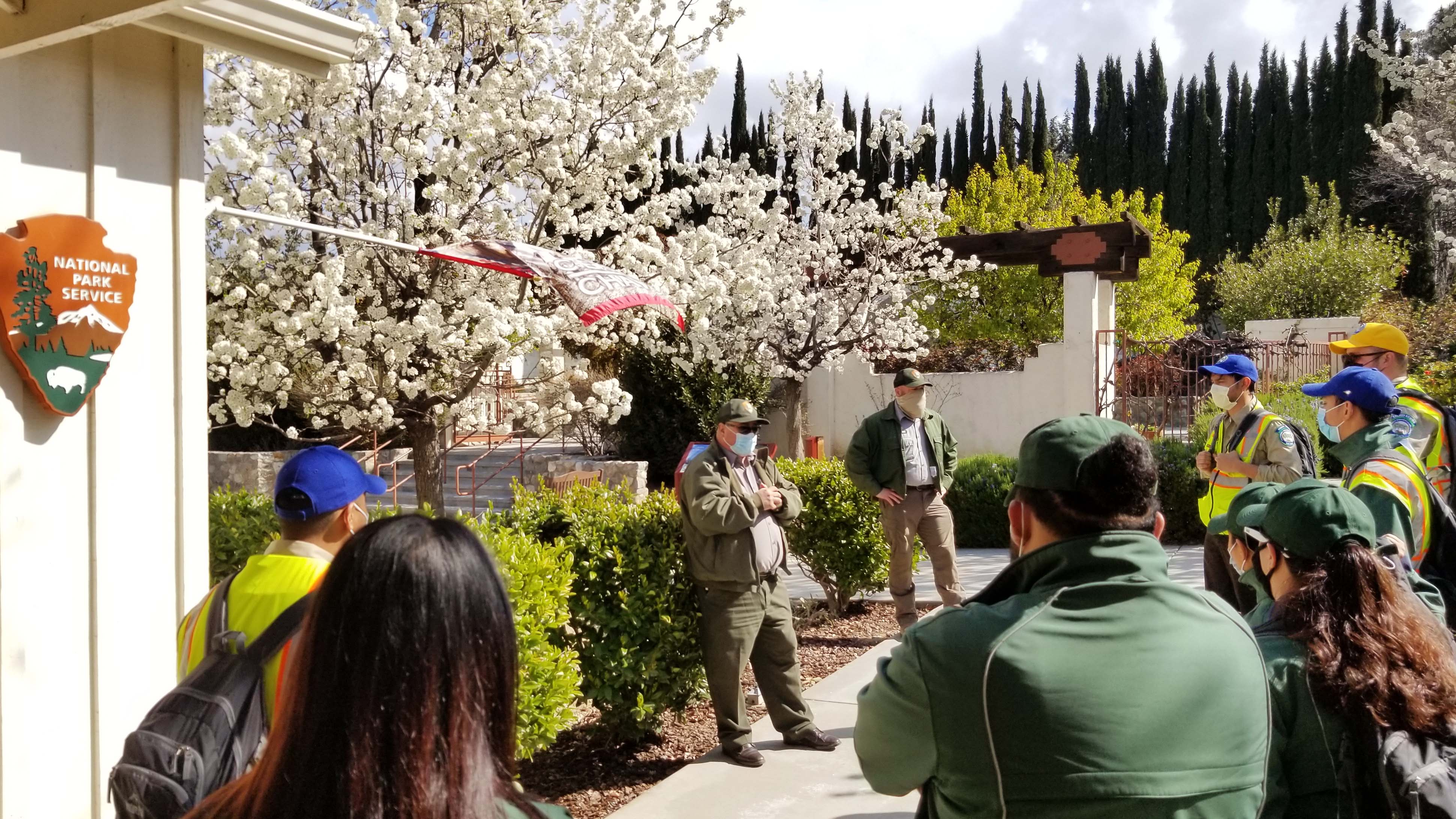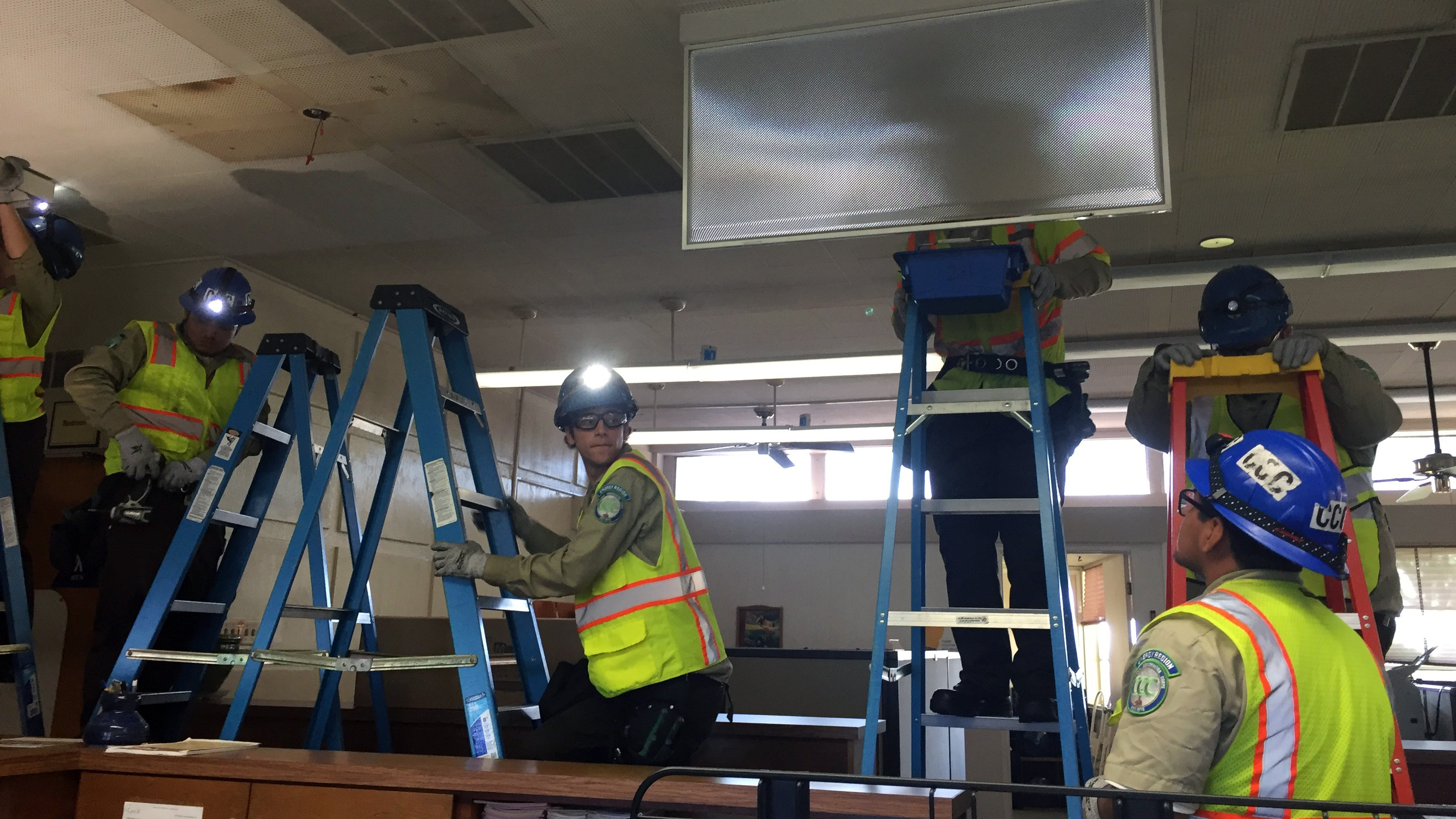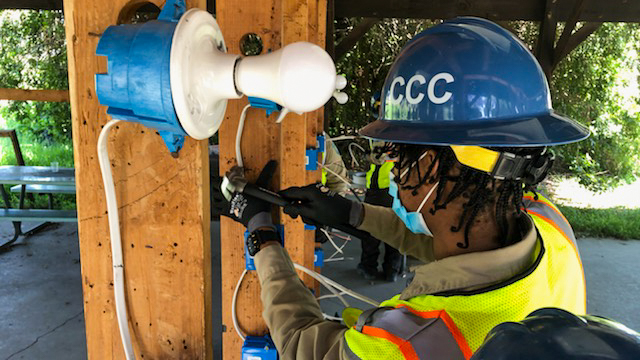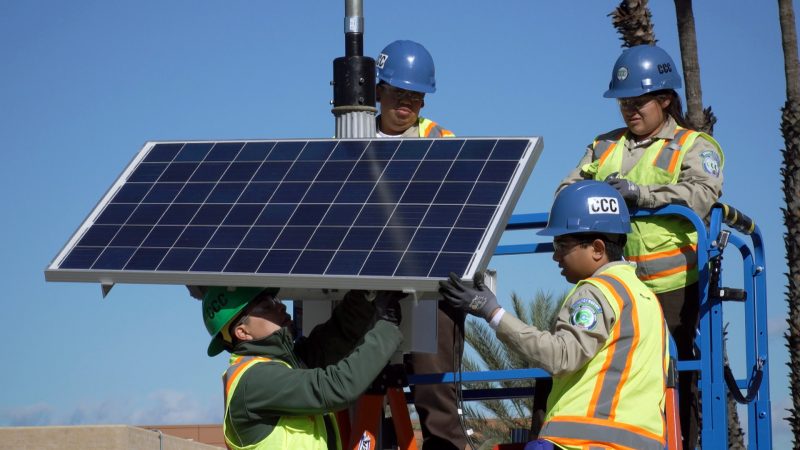Norwalk Center
The CCC Norwalk Center is committed to reducing greenhouse gas emissions throughout the state. As many as 50 Corpsmembers enroll at the center and can serve on Energy Corps crews committed to green technology projects, or on a natural resources crew.
Corpsmembers may learn basic electrical skills that lead to meaningful careers in the energy and green technology fields. On the natural resource crew, Corpsmembers will complete projects aimed at reducing greenhouse gas emissions, including fuel reduction and trail maintenance.
Corpsmembers commute to the center for work each day. Corpsmembers typically work 10-hour shifts Monday through Thursday, which may include evening shifts to complete energy projects during off-hours at government and non-profit buildings. A majority of the work takes place in Los Angeles, Ventura, Orange, and San Bernardino counties, but crews can complete work anywhere in the state as needed. The facility is located on the grounds of Metro State Hospital.
The center partners with Cerritos College to offer all Corpsmembers enrollment in a state approved apprenticeship program. All Norwalk Energy trainings count toward earning a Nonresidential Lighting Technician (NRLT) license.
11401 South Bloomfield Avenue
Norwalk, CA 90650
559-498-9502
Life at the Norwalk Center

CCC Norwalk Corpsmembers listen to docents from the National Park Service talk about the Cesar Chavez National Monument in Keene, CA where Corpsmembers lent a helping hand with landscaping and beautification.
Corpsmembers live at home and report to work at the Norwalk Center each day. Corpsmembers often have class before work, either to complete their high school diploma or other CCC Core Trainings. They then report to roll-call and leave to the project site where they work.
A Corpsmember Advisory Board (CAB) meets once a month, or when needed during that month, to discuss possible volunteer projects, recycling opportunities for CAB, upcoming events and community issues.
Corpsmembers participate in an active volunteer program. Corpsmembers are required to perform a minimum of 48 hours of volunteer service in their first year to earn the CCC Brad Duncan Scholarship. Examples of volunteer work include beach clean-ups, assisting local municipalities with special events, and helping a nonprofit organization called GRID Alternatives with solar installations in low-income communities.
Projects

A Norwalk Energy Hub crew wears head lamps to light up their work area while retrofitting a classroom’s lighting system.
The Norwalk Energy Center works on energy projects, energy surveys, retrofit projects, solar installation, and EV charging station installation. Project sponsors include school districts, colleges, Judicial Council of California (JCC), and state, county and city agencies, as well as non-profits. A year in the CCC Energy Corps provides an excellent base for launching a career in green technology. Corpsmember train in state-of-the-art facilities where they gain hands-on training in basic electrical, solar, and EV charging.
The center’s natural resource crew completes trails maintenance, fuel reduction to reduce fire danger, tree planting, and other projects focused on greenhouse gas reduction. Norwalk is currently committed to State Parks projects in Santa Cruz County, just south of the San Francisco Bay Area. Corpsmembers often “spike”, which means they camp near work sites to lessen commute and enhance time spent on projects. This crew travels between Norwalk and Big Basin State Park every Wednesday, either traveling to or from the project location. The crew then is off from work every other Thursday through Tuesday.
All Corpsmembers are required to respond to emergencies. These can occur at any time of the year and can include floods, fires, pest infestations, and oil spills. Corpsmembers may only have a few hours to pack up and report for duty, traveling to various regions of the state for up to 21 days at a time working 16-hour shifts.
Education and Training

Norwalk Energy Hub Corpsmembers are trained in Aerial Lift and Scaffolding safety. These Corpsmembers are retrofitting light fixtures at Foltz Courthouse in Los Angeles.
The Norwalk Center partners with Cerritos College as part of its training program. The partnership is a state approved school, as certified by the California Community College Chancellor’s Office and California Department of Industrial Relations. Only enrolled Corpsmembers can take the course work through Cerritos.
All Norwalk Energy Center trainings apply toward earning a Nonresidential Lighting Technician (NRLT) license. To be eligible to take the NRLT exam with DIR, Corpsmembers must accumulate 2,000 hours of classroom and project work. Energy Corpsmembers will typically earn those hours in 12 to 24 months.
The NRLT license is the entry level electrician license in the State of California. Once all hours are met, Corpsmembers can apply to take the NRLT exam. Corpsmembers must pay the fees to take the exam, and then pass it, to earn the certification.
All Corpsmembers are required to complete Corpsmember Orientation, Motivation, Education, and Training (COMET) and core training courses.
Specialized trainings and certifications available at the Norwalk Center:
- Building Envelope
- Cal-OSHA 10-Hour Safety Training for Construction
- Electrical Concepts
- Energy Audits
- Energy Efficiency Basics & Data Collection for Energy Surveys
- Energy Efficiency Fundamentals
- First Aid & CPR
- Introduction to Wiring and Lighting Retrofits
- Introduction to Solar Photovoltaic Systems
- Caltrans Electrical Internships
- Ladder Safety
- Lighting Control Installation
- Lighting I: Lighting Your Way
- Lockout-Tagout
- Maintenance Best Practice for Energy Efficient Facilities
- Power Tools Safety and Operation
- Safety Stand Down
- Scissor (Aerial) Lift
- ServSafe Food Handler Certification
- Electrical Vehicle Charging Station Installation Training
A partnership has been established with Metro State Hospital to offer the following internships to Corpsmembers:
- Paint Shop Intern
- Landscape Intern
- Kitchen Intern
- Electric Shop Intern


